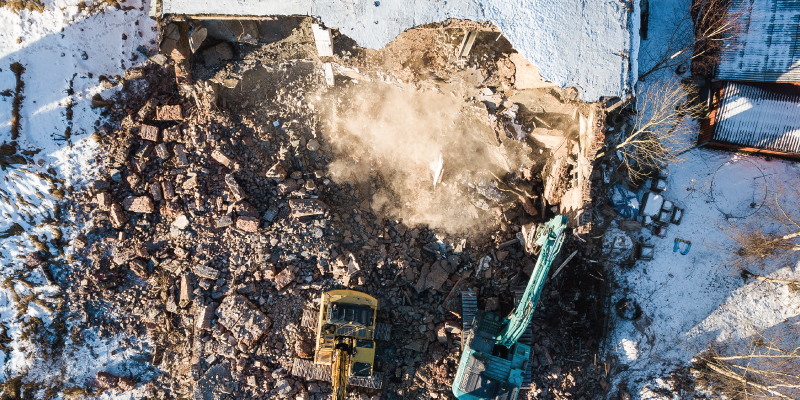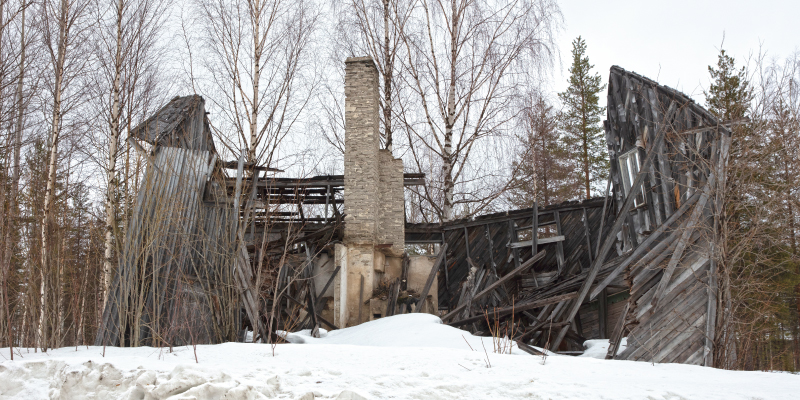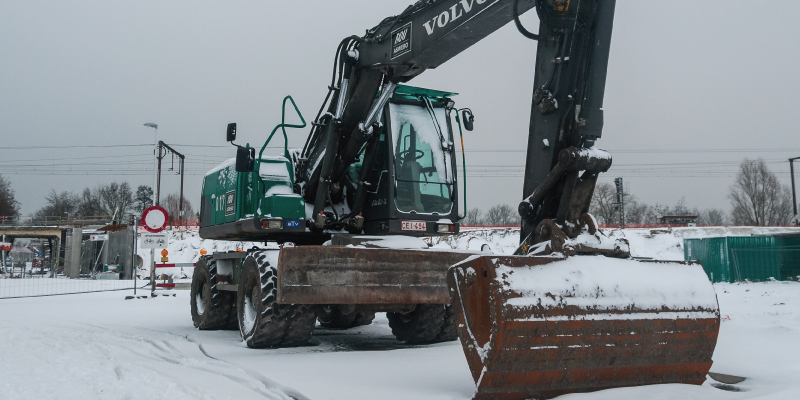
Updated March 4, 2025
When the winter season rolls around, many people assume that demolition projects have to wait. Cold weather, frozen ground, and shorter days may seem like serious road blocks to getting a demolition project done, but the truth is that a majority of demolition projects can still be completed during the winter months—as long as contractors are prepared and the right strategies are in place.
If you have a demolition project you need to tackle leading into the colder months, you may be curious if it's too cold for demolition. In this article, we'll address common misconceptions, explain how cold weather impacts the demolition process, and break down how professional demolition companies prepare for and adapt to wintery conditions.
Table of Contents:
- Can Your Demolition Project Be Done in Winter?
- How Cold Weather Affects Demolition Projects
- Benefits of Winter Demolition
- How to Prepare for Winter Demolition
Find demolition contractors near you
Can Your Demolition Project Be Done in Winter?
In short, yes.
One of the most common misconceptions about winter demolition is that it simply cannot happen due to frozen ground, snow, and ice. People often assume that, because the ground is frozen and temperatures are low, excavation and demolition aren't possible, or that cold weather and snow put equipment at risk. While winter certainly presents some challenges, experienced demolition companies are equipped to handle them.
With the right team and preparation, most demolition projects can proceed in winter. Whether you're tearing down an old garage, removing an outbuilding, or preparing a site for new construction, professional demolition companies have the experience and tools needed to navigate cold weather challenges.
If you're facing a demolition project, don’t let cold temperatures stop you from moving forward this winter. By working with a reputable demolition contractor, you can start your project confidently and keep things moving efficiently, regardless of what the thermometer says.
Keep reading: Can I Remove or Replace Concrete in the Winter?
How Cold Weather Affects Demolition Projects

Winter weather can affect demolition in a number of ways:
Snow and Ice
Snow and ice can create hazardous conditions on a demolition site. Slippery surfaces increase the risk of accidents for workers and equipment, and snow buildup can hide debris or complicate clean-up efforts.
How Contractors Adapt:
-
Teams clear snow and ice as needed from work areas before beginning demolition.
-
Sand, salt, or de-icing agents are applied to improve traction on surfaces as needed.
-
Crew conducts thorough site inspections to identify hidden hazards and ensure safe working conditions.
Frozen Ground
When temperatures drop below freezing, the ground can become hard and compact. This makes tasks like excavation and foundation removal more challenging, but it's still possible. Heavy machinery, such as excavators, may have to work harder to dig into frozen soil, which can increase fuel consumption and equipment wear.
How Contractors Adapt:
-
Demolition crews may use specialized equipment designed for breaking through frozen ground, such as hydraulic hammers, frost teeth attachments for excavators, or ground-thawing systems.
-
Scheduling can be adjusted to allow extra time for excavating in colder conditions.
-
When possible, crews may complete work in phases, focusing on non-excavation tasks during the coldest days.
Shorter Daylight Hours
Winter brings fewer hours of daylight, which means less time to complete work during traditional daylight shifts. Shorter days can extend the overall timeline of a project if not managed carefully.
How Contractors Adapt:
-
Demolition crews may use portable, high-powered lighting to extend work hours safely.
-
Teams plan and prioritize tasks to maximize productivity during daylight hours.
-
Some projects incorporate staggered shifts to make the most of available daylight.
Find demolition contractors near you
Benefits of Winter Demolition
While winter demolition comes with some challenges, it also offers several advantages, like...
-
Faster Permitting: Since winter is generally considered the "off-season" for demolition, permit approvals may move more quickly than during peak months.
-
Increased Availability: Contractors may have greater availability in the winter, meaning you can schedule your project sooner.
-
Reduced Downtime for Property Owners: Completing demolition in winter allows property owners to start projects as soon as spring arrives.
How to Prepare for Winter Demolition

Proper preparation is key to overcoming winter demolition challenges. Professional demolition contractors take several steps to ensure projects remain on schedule and operate smoothly, even in cold weather.
1. Pre-Planning and Scheduling
Winter demolition requires detailed planning. Contractors evaluate weather forecasts, site conditions, and project requirements to create a flexible schedule. Tasks are often prioritized based on weather patterns, with indoor demolition or lighter tasks scheduled for particularly cold or snowy days.
2. Equipment Maintenance and Winterization
Demolition machinery is the backbone of any project, and cold weather can affect its performance. Contractors take the following measures to keep equipment running efficiently:
-
Use cold-weather lubricants and fluids that withstand low temperatures.
-
Keep equipment batteries charged and warm to prevent freezing.
-
Regularly inspect and maintain machines to minimize downtime.
-
Allow equipment to warm up before operation to avoid mechanical strain.
3. Site Safety Measures
Safety becomes even more critical in winter conditions. Contractors implement measures to ensure the safety of their crews and equipment:
-
Clearing pathways and work areas of snow and ice.
-
Providing workers with appropriate winter gear, such as insulated clothing and non-slip boots.
-
Monitoring worker health to prevent cold-related illnesses like hypothermia or frostbite.
-
Using heaters in break areas to provide crews with a warm place to rest.
Read more: What to Expect When Demolishing a Structure in Winter
Final Thoughts
Demolition doesn’t stop when the snow starts falling. With careful planning, specialized equipment, and safety measures in place, winter demolition is not only possible but often practical. While frozen ground, shorter days, and icy conditions present challenges, professional contractors know how to handle them and keep your project moving forward.
So, is it too cold for demolition? Not at all. If you’re ready to tackle your demolition project this winter, contact an experienced contractor to get started. With the right preparation, your project can be completed efficiently, safely, and on schedule—no matter how cold it gets.


